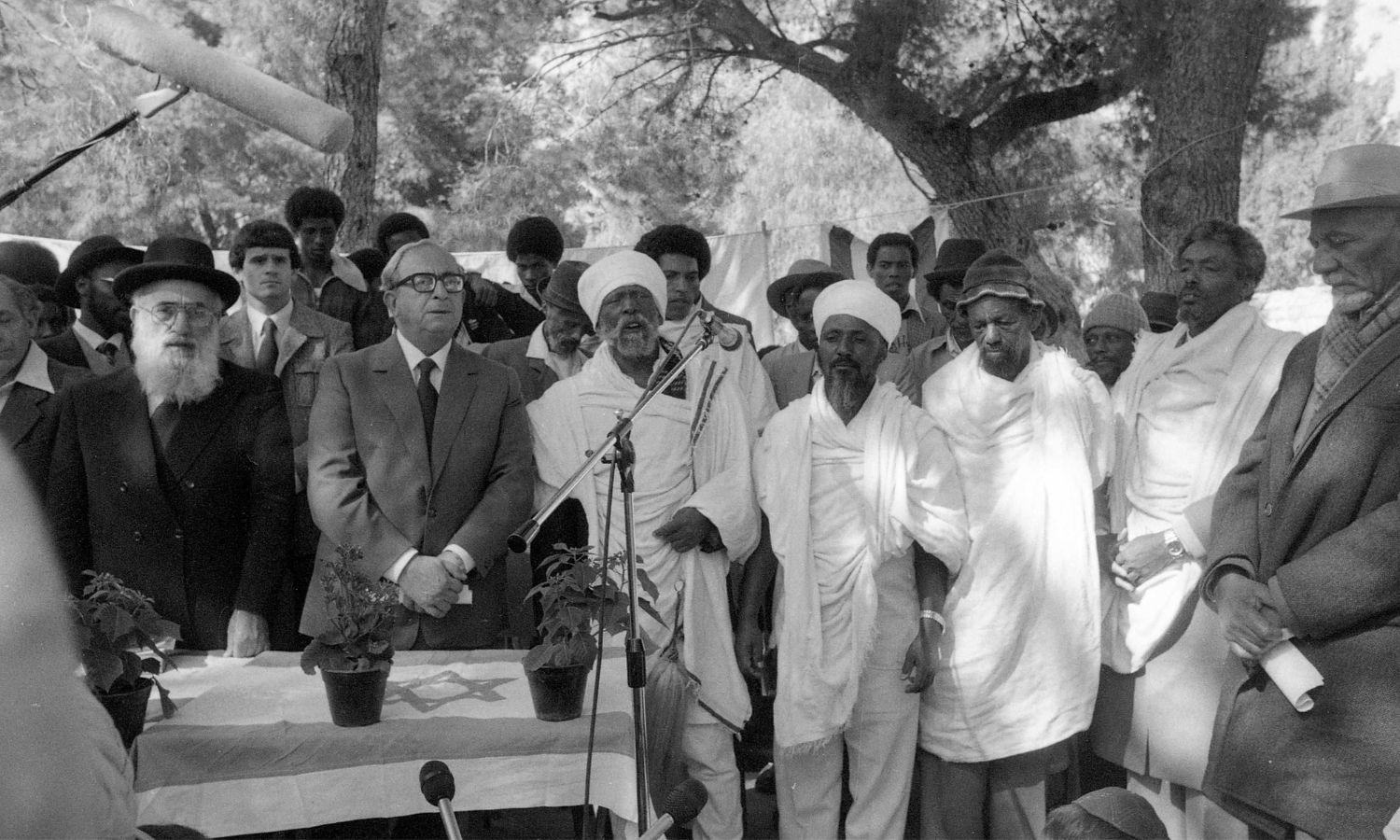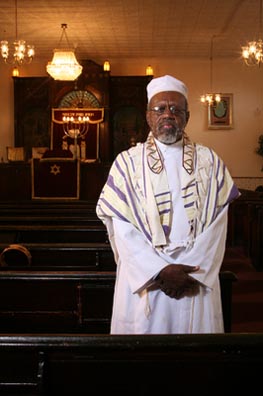We want to invite American Jews to join in song with our Ethiopian siblings in the joy of celebrating the everlasting Jewish connection to Jerusalem. Since 2008, Sigd has been recognized as a national holiday in Israel. In the streets of Jerusalem, thousands of Ethiopian Israelis come together from all over Israel to celebrate Sigd. They gather in the neighbourhood of Armon Hanatziv facing the Western Wall of the destroyed ancient Temple. The religious leaders of the Ethiopian Jewish community, the Kessim, lead the celebration praying and praising God for making their dream of coming to Jerusalem true. These Ethiopian Jewish rituals as well as the song below, connect Ethiopian Jewish tradition to the timeless universal Jewish longing for Jerusalem.
Historically, Sigd existed only on the Ethiopian Jewish calendar. Fifty days after Yom Kippur, on the 29th day of the Hebrew month of Cheshvan, Jews would come from all over to gather near the base of Mount Ambover in Gondar. In the morning, the community, dressed in white, would climb the mountain with their religious leaders — the Kesim — and others carrying umbrellas to shade them from the sun.
Many Ethiopian Jews speak Amharic. The word Sigd comes from the Amharic word for worship or “to bow down.” Arriving at the top of the mountain, worshippers would prostrate themselves in prayer and read passages from the Orit, the first eight books of the Torah translated into Ge’ez, the Ethiopian Jewish holy language. Fasting throughout, they would pray for forgiveness. When the prayers were done, the community would descend the mountain and gather for a feast, coming together in joy and fellowship.
One of the key themes of their prayers was a return to Jerusalem. Ethiopian Jews did not know of the destruction of the First Temple, of the building and destruction of the Second Temple, or even of the early days of the Zionist movement. Yet like Jews around the world, they continued to pray for return. Centuries passed and their hope did not waver.
The following song speaks directly about the longing for Jerusalem and the return to Zion; the holy city with the pure light. Some parts of the song like the line that says ‘selam Leki’ are written in Ge’ez. The singer is Grammy nominated Gili Yalo, an Ethiopian Israeli musician who embodies his own personal story, which inspired the rhythm and flow of his work.
And what a story he has to tell: during Operation Moses, the covert evacuation of Ethiopian Jews from Sudan during a famine in 1984, Yalo and his family made the perilous journey from their native land by food. The vision of getting to the “Promised Land” sustained them and throughout the adjurous trip they sang to inspire themselves and give them courage. In the course of this exhausting and emotional journey, the music encouraged Gili Yalo and his family to keep on moving.
Here are the words for his version of this traditional Ethiopian Jewish song and my translation. Note that the word Salem is the final syllable of the word Jerusalem and appears in this song as a shorthand for Jerusalem.
Salem
Your face is In a pure light,
the holy city of Zion
Hello to you, our city
Peace, may peace be upon you
Immigrant migrant
Peace, may peace be upon you
May peace be upon the Temple
Like a big light on your face …
Hello hello hello to you
Jerusalem Salem
Hello hello hello to you
The Temple of peace
Peace, may peace be upon you
Immigrant migrant
Salem Salem Leki
כְּמוֹ אוֹר גָּדוֹל פָּנַיִךְ עִיר צִיּוֹן הַקְּדוֹשָׁה
שָׁלוֹם לָךְ עִיר
בְּתוֹך אוֹר טָהוֹר פָּנַיִךְ עִיר צִיּוֹן הַקְּדוֹשָׁה
שָׁלוֹם לָךְ עִיר
בְּתוֹך אוֹר גָּדוֹל פָּנַיִךְ עִיר צִיּוֹן הַקְּדוֹשָׁה
שָׁלוֹם לָךְ עִיר
כְּמוֹ אוֹר טָהוֹר פָּנַיִךְ עִיר צִיּוֹן הַקְּדוֹשָׁה
שָׁלוֹם לָךְ עִיר
בְּתוֹך אוֹר טָהוֹר פָּנַיִךְ עִיר צִיּוֹן הַקְּדוֹשָׁה
שָׁלוֹם לָךְ עִיר
כְּמוֹ אוֹר גָּדוֹל פָּנַיִךְ עִיר צִיּוֹן הַקְּדוֹשָׁה
שָׁלוֹם לָךְ עִיר
כְּמוֹ אוֹר טָהוֹר פָּנַיִךְ עִיר צִיּוֹן הַקְּדוֹשָׁה
שָׁלוֹם לָךְ עִיר
כְּמוֹ אוֹר גָּדוֹל פָּנַיִךְ עִיר צִיּוֹן הַקְּדוֹשָׁה
שָׁלוֹם לָךְ עִיר
סֶלַם סֶלַם לֶקִי
סֶלַם סֶלַם לֶקִי
סֶלַם סֶלַם לֶקִי
הָגֶר אַבְּהָוֶוינָה
סֶלַם סֶלַם לֶקִי
סֶלַם סֶלַם לֶקִי
סֶלַם סֶלַם לֶקִי
בֵּית מִִקְדּסוֹ סֶלַם
כְּמוֹ אוֹר גָּדוֹל פָּנַיִךְ…
שָׁלוֹם שָׁלוֹם שָׁלוֹם לָךְ
שָׁלוֹם שָׁלוֹם שָׁלוֹם לָךְ
שָׁלוֹם שָׁלוֹם שָׁלוֹם לָךְ
יְרוּסָלַם סֶלַם
שָׁלוֹם שָׁלוֹם שָׁלוֹם לָךְ
שָׁלוֹם שָׁלוֹם שָׁלוֹם לָךְ
שָׁלוֹם שָׁלוֹם שָׁלוֹם לָךְ
בֵּית מִקְדָּסוֹ סֶלַם
סֶלַם סֶלַם לֶקִי
סֶלַם סֶלַם לֶקִי
סֶלַם סֶלַם לֶקִי
הָגֶר אַבְּהָוֶוינָה
סֶלַם סֶלַם לֶקִי
סֶלַם סֶלַם לֶקִי
אֶרֶץ אֲֲבוֹתֵינו
סֶלַם סֶלַמֶה סֶלַמֶה
K’mo or gadol panaich ir tzion hakedosha
Shalom lach ir
B’toch or tahor panaich ir tzion hakedosha
Shalom lach ir
B’toch or gadol panaich ir tzion hakedosha
Shalom lach ir
K’mo or tahor panaich ir tzion hakedosha
Shalom lach ir
B’toch or gadol panaich ir tzion hakedosha
Shalom lach ir
K’mo or gadol panaich ir tzion hakedosha
Shalom lach ir
K’mo or tahor panaich ir tzion hakedosha
Shalom lach ir
K’mo or gadol panaich ir tzion hakedosha
Shalom lach ir
Selam selam leki
Selam selam leki
Selam selam leki
Hagar abhavavna
Selam salam leki
Selam selam leki
Selam selam leki
Beit Mekdiso selam
K’mo or …
Selam selam leki
Selam selam leki
Selam selam leki
Hagar abhavavna
Selam salam leki
Selam selam leki
Selam selam leki
Eretz Avoteinu
Selam selmeh selmeh







